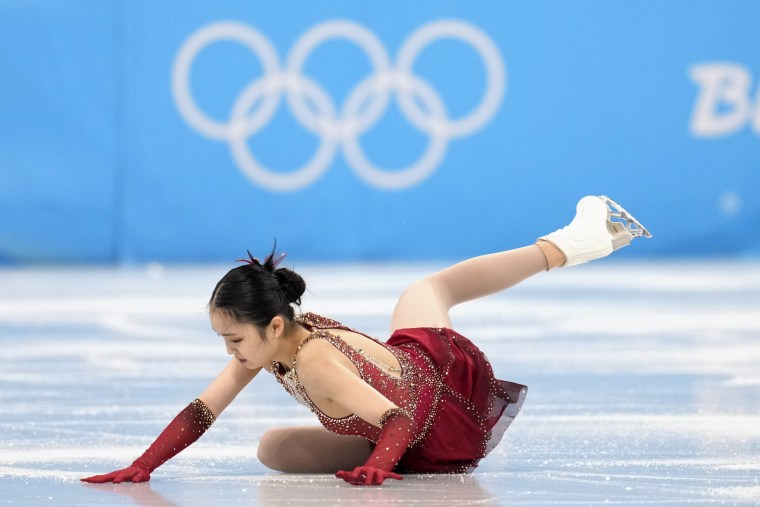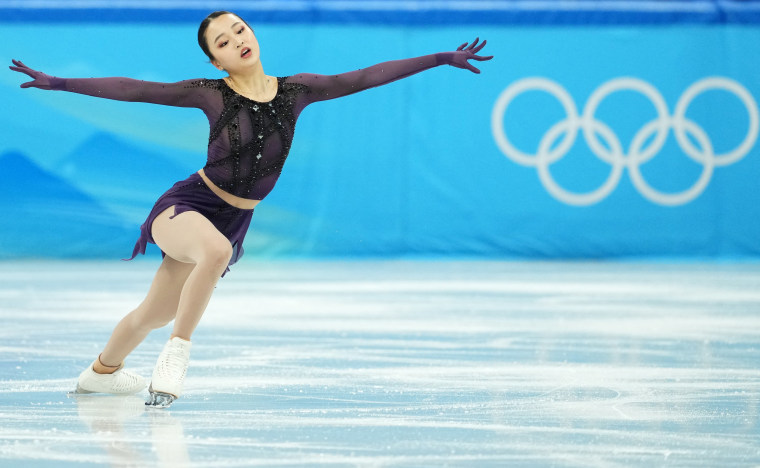Zhu Yi, the Los Angeles-born figure skater who decided in 2018 to represent China in competition, fell during the women’s singles short program on Feb. 6 — which took China from third place to fifth — and fell twice during the women’s free skate the following day. Afterward, the 19-year-old was subjected to a torrent of online abuse on the Chinese social media platform Weibo.
The hashtag #ZhuYiFellDown had over 200 million views within hours. She was attacked for not being able to speak fluent Chinese, disparaged for being born in the U.S. and chided for becoming emotional after her routine. “I hate that she’s crying. Can crying solve anything?” one user wrote. Others called her “disgraceful” and “rotten.” Some Americans celebrated her falls on Twitter because she gave up her U.S. citizenship and changed her name from Beverly Zhu in order to represent China.

Zhu is one of at least a dozen foreign athletes who were recruited by China to boost its prospects at the 2022 Winter Games. However, no one else has received the level of vitriol experienced by the figure skater, with some users making baseless accusations that her prominent computer scientist father helped her gain a spot on the team.
“I think the scrutiny speaks to the cultural citizenship she lacks in the eyes of a lot of Chinese viewers: that she doesn’t speak the language, that she didn’t grow up there, that she doesn’t have her own cultural roots in China,” Christina Chin, co-editor of “Asian American Sporting Cultures,” told NBC Asian America. “These athletes have a kind of really fine tightrope they have to walk to navigate. It’s an impossible Catch-22 for them to be able to please both expectations from both countries.”
Experts said Zhu was targeted due to a combination of her gender, young age, the massive popularity of figure skating and the fact that the Winter Olympics are set in Beijing during a time when the U.S. and China have a fraught geopolitical relationship. For many Asian Americans, Zhu’s treatment during the Games highlighted some of the challenges that come with having a bicultural identity.
Ellen Wu — a historian who researches race, migration and belonging in United States history — said the duality Asian Americans experience was a common occurrence for the migrant generation and their children, pointing to the experience of American-born Japanese people in the 1920s and 1930s, many of whom had dual citizenship as the U.S. and Japan were ratcheting up their imperial rivalry.
“A lot of the Nisei generation thought the way to deal with this was to position themselves as ‘bridges of understanding,’” Wu said. “By World War II, a lot of those young people were forced to choose sides, and many of them fought for the U.S. in the armed forces.”
She said Asian Americans often live in “between” spaces, countries and the Black-white racial order in the U.S. Wu said there is a long tradition of Chinese people scrutinizing those of Chinese ancestry who grew up outside of China.
“I do think even from growing up here in the U.S. and personal observations, there’s a culture of judgy-ness in terms of people’s language ability for American-born Chinese,” she said. “You either get complimented or criticized or denigrated based on your language abilities — it can be scarring.”
In contrast to Zhu, 18-year-old, U.S.-born Eileen Gu, who competed for China and on Tuesday became the youngest Olympic champion in freestyle skiing, has been lauded for her impeccable Mandarin and is the darling of Chinese social media, although she has faced plenty of critics as well.
Anthropologist Stanley Thangaraj, who studies race and gender in sports and is the author of “Desi Hoop Dreams,” said failure is an inherent part of sports, but when women don’t live up to expectations, they are subjected to harsher treatment, especially in China, where gender inequalities remain.
“For Zhu, not being able to speak Mandarin as fluently is already something that if she had won gold wouldn’t have mattered, but in failure, women become the ultimate site of negotiating national identity,” Thangaraj said. “That failure is not allowed because of the very notion that she is not Chinese enough in one context and not American in the other.”
Thangaraj said numerous NBA players have played for other countries in the Olympics and that American coaches have worked with foreign teams to little fanfare.
“When it’s the presence of white folks going and playing elsewhere, it’s helping a country evolve its sport, but when it’s someone who’s Asian American, it shows how precarious our sense of belonging is when we choose another place to represent,” Thangaraj said.
“For people who occupy more complex identities, we find ourselves very out of place in the larger scheme of things, where the nation and demarcation of citizenship never includes us, either here or ‘back home,’” Thangaraj said.
